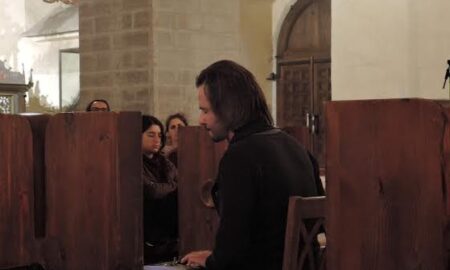“Estonian Composers in Berlin”
Tobias Quartet, Harry Liivrand, Pärt, Reinvere, Tobias
Estonia Concert Hall
April 8, 2016
Stepping through the open door to the music world of the national concert shrine, wishing to find the greenery of sound, the invitation by chamber music can clearly be heard… In the foyer of the Estonia Concert Hall, the first unexpected thing that catches the eye is a gallery of framed color photos of the most important buildings in the city of Berlin, which the three composers of the concert about to start – Rudolf Tobias, Arvo Pärt and Jüri Reinvere – are connected to. In fact, it is only a preparation for a bigger surprise awaiting the concert-goers in the honorable hall above, where it has not been deemed too much to erect a new stage for the chamber concert “Estonian Composers in Berlin”. In the big hall, in front of a dark screen, the Tobias String Quartet, including Maano Männi (violin), Terje Männi (violin), Toomas Nestor (viola), and Aare Tammesalu (cello), will perform.
The senses of the listeners sitting in the bright beam of light are first introduced to the topic of Berlin by art critic and diplomat Harry Liivrand. He lines up the appropriate facts, after which a mental musical map is drawn in green tones from the festive-grandiose string quartet in the romantic style created by Rudolf Tobias in the beginning of the last century to the premiere of a chamber music work by today’s younger generation composer Jüri Reinvere, enriching the color gamma by the quartet versions of the audience favorites by Estonia’s internationally best-known composer Arvo Pärt.
The first event in the series of Estonian Music Days took place in 1979, when the Estonian Composers’ Union acting under the foreign rule felt that national music was played far too little. The idea to organise a thematic festival turned out to be a suitable pretext for obtaining the permission of the authorities to perform Estonian music and bring it closer to the wider audience. In hindsight, there was every reason for this undertaking, as the great men of Estonia’s music world today, composer Arvo Pärt (born 1935) and conductor Neeme Järvi (born 1937), prepared to leave their home country the following year for good, needing much greater freedom for their upcoming creative work. It was a time when it wasn’t even appropriate to secretly dream about the opportunities for life and creation, that are open today.
The world city of Berlin is only a mentally connecting axis for the composers of this concert, as both Tobias’s 2nd string quartet (1902) and Pärt’s Fratres and Summa (both 1977) have been written before the authors ever arrived in Berlin. It is not known, what the 29-year-old composer Rudolf Tobias (1873-1918), who was the first Estonian to graduate as a composer in St. Petersburg, thought of the things of the world and Berlin, his future place of dwelling and work, when he created his 2nd string quartet carried by romantic moods. But here, not only a residence-based parallel can be drawn with the future tintinnabuli-master Pärt, whose composition teacher Heino Eller (1887-1970) was truly influenced to concentrate on composing by Tobias’s quartet lessons in his youth. In the creations of Pärt and Tobias, honesty and grandeur are highlighted in the treatment of the eternal themes, making the listener look inside themselves again and again while hearing the unique performances of these works. This time was no exception.
If anyone wishes to find a composer among the Estonian younger generation, who is not afraid of responsibility or big challenges, Jüri Reinvere’s (born 1971) name comes up. He has only recently attracted the attention of our Nordic neighbors Finland (opera “Purge” in the Finnish National Opera in 2012) and Norway (opera “Peer Gynt” in the Norwegian National Opera in 2014), in music circles and wider cultural community, having lived in the city of Berlin for more than ten years now. His modern operas will await the reviews of future music critics and historians who will have the advantage of distance. However, at this concert, the listeners of “Let”, the third quartet of the cycle “Four Quartets”, were helped by the reminder of the cycle’s first part while forming their opinion.
Bestselling writer Sofi Oksanen characterises Reinvere as a “real Estonian-born cosmopolite”, which the composer acknowledges in the August edition of the magazine “Music”: “I am always changing, always absorbing the new. Wherever I am, I am what the country changes me to.” The countries seen and experiences undergone are a great source of inspiration for a creative nature, shared with both performers and listeners later on. “Let” has been written in Swiss Alps – a fairy and green land for those who have grown up on the plains, the miraculous influences of which were reflected in the expressions of the performers as well as the enthusiasm of the phonogram readers, among them English actor Peter Yearsley. I caught myself thinking, what would the work sound like, if the verbal and musical parts were intertwined in a live performance? We have a number of great actors, whose simultaneous performance of the Estonian text in collaboration with the string quartet could give the work a whole new dimension.
It is extremely interesting to listen to the chamberous side of the world view of the renowned composers – will it exude the “grandiose monumentalism” or can we feel different currents altogether. This is how every piece performed found its own audience in the hall, leaving the answers in everyone’s heart and thoughts, to die away in the green enchantment as a recollection.
Estonian Music Days take place from April 7 to 16.

